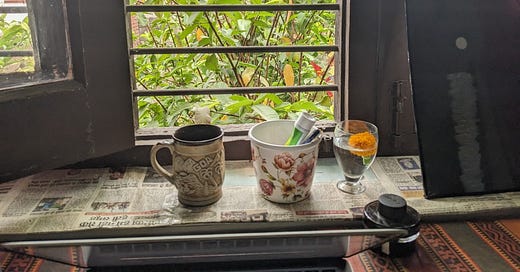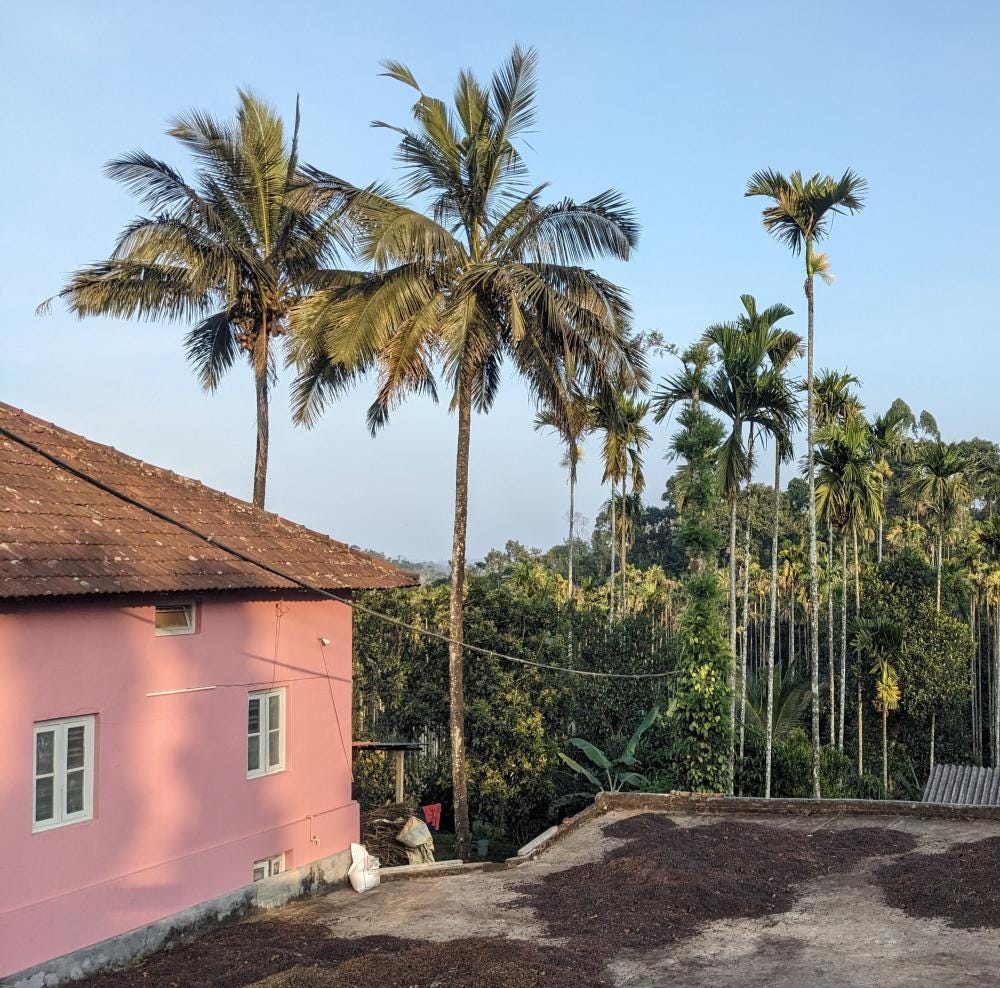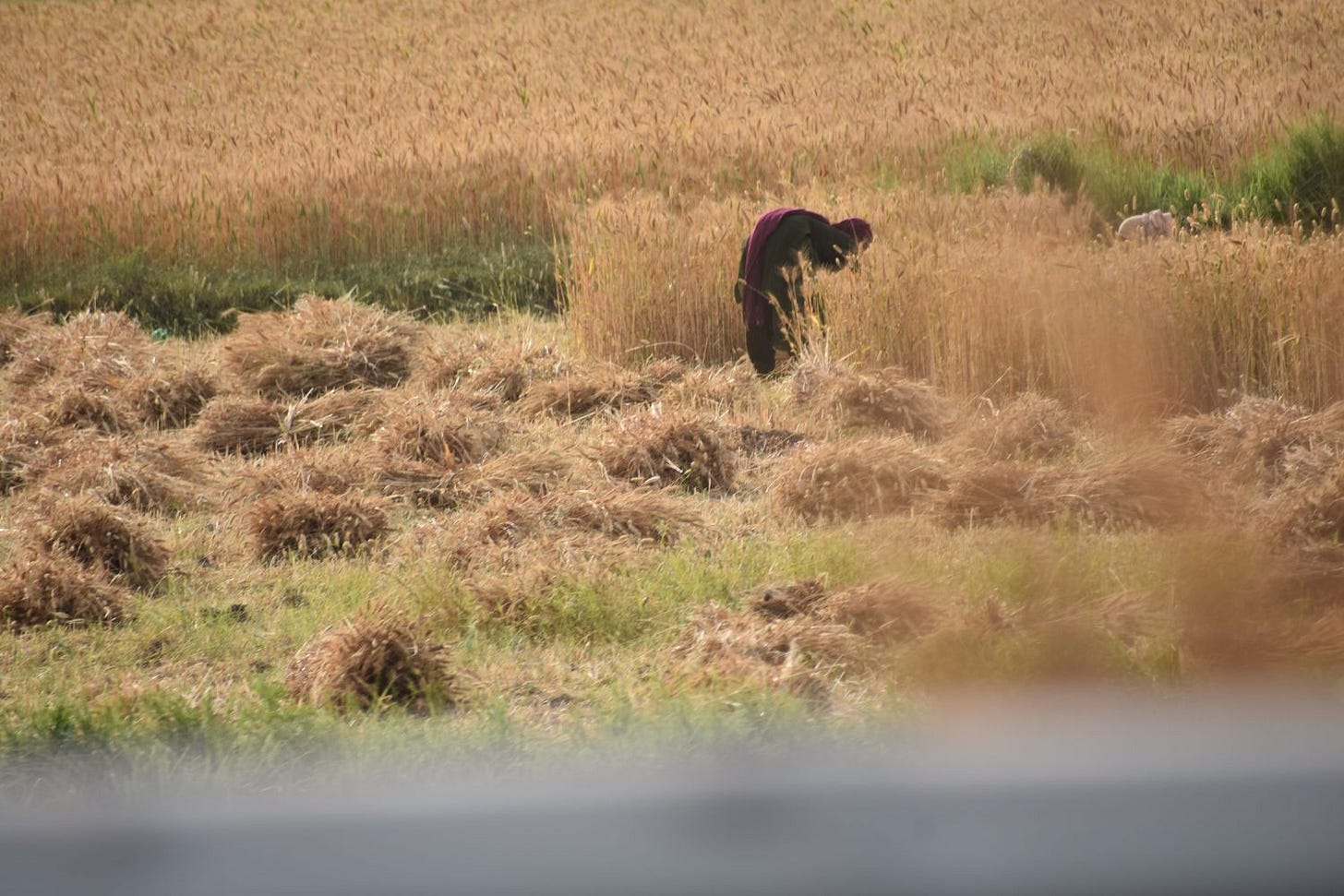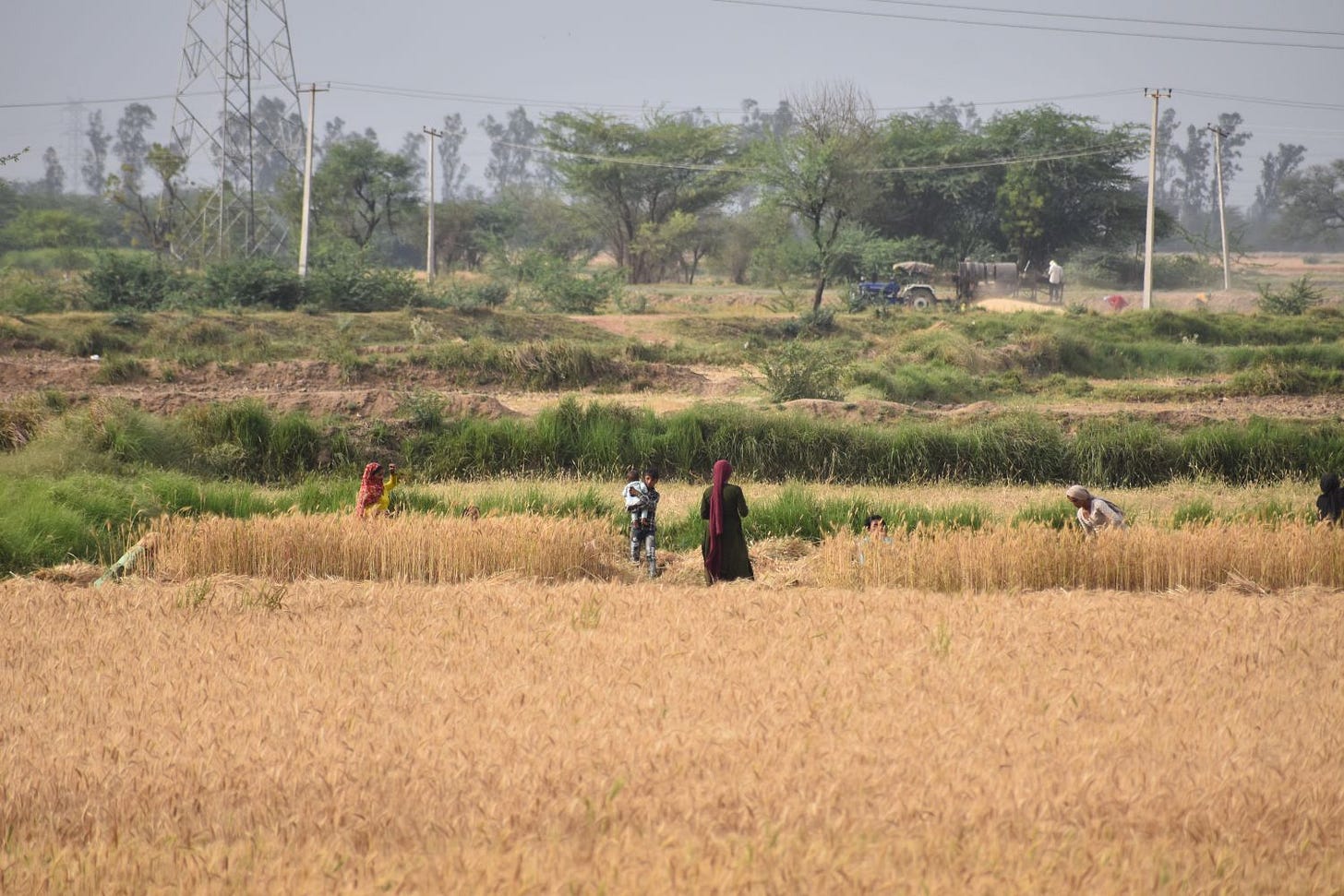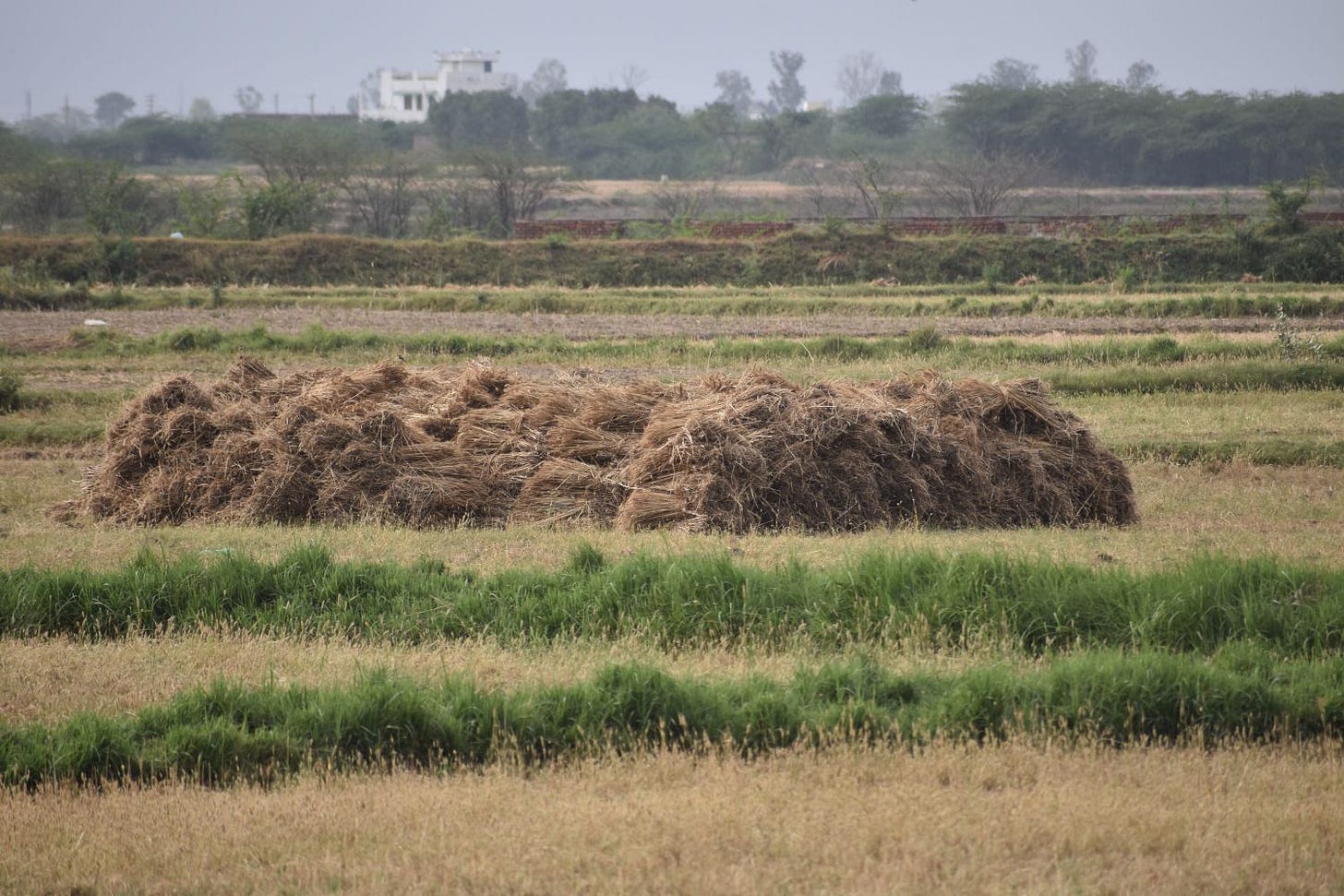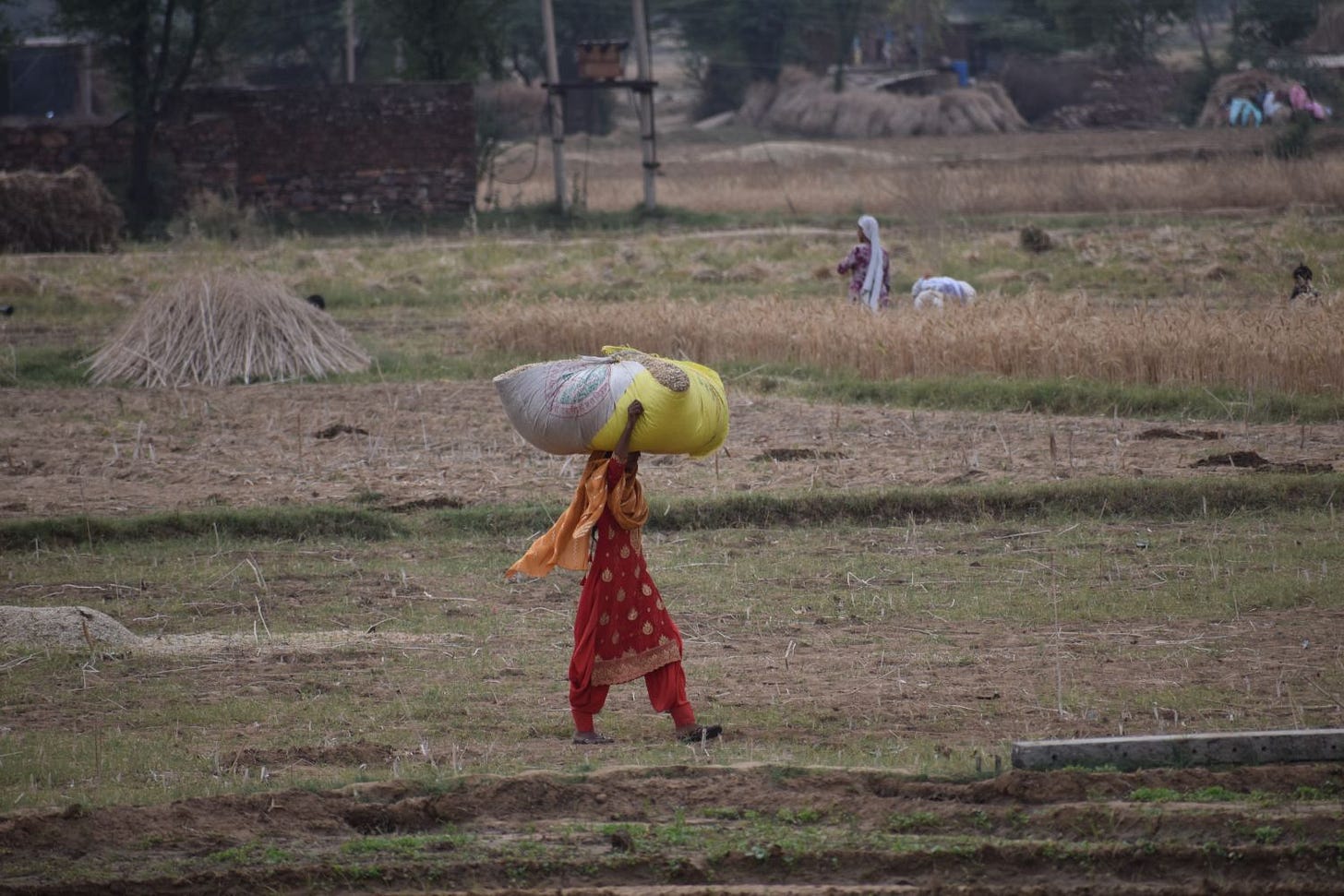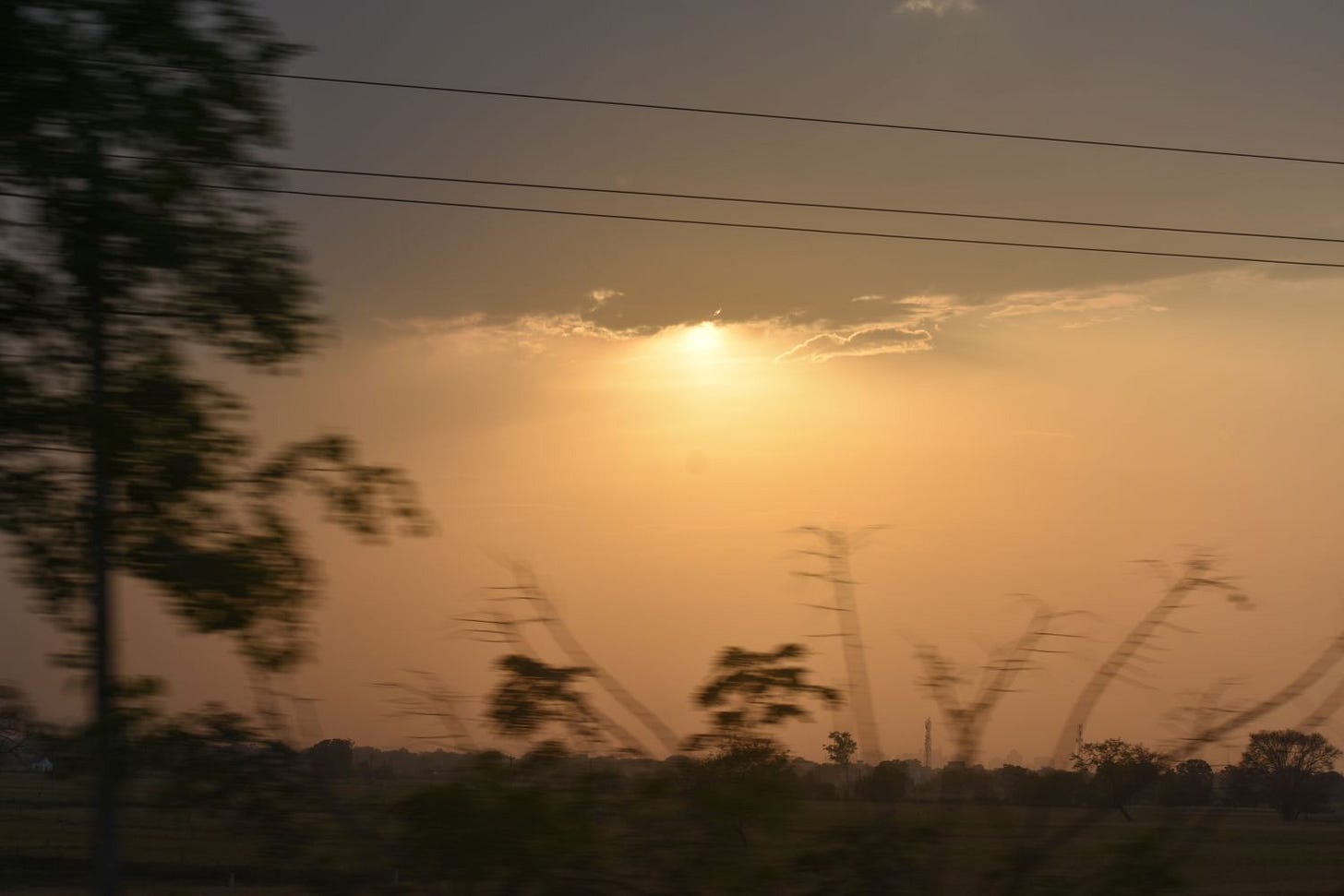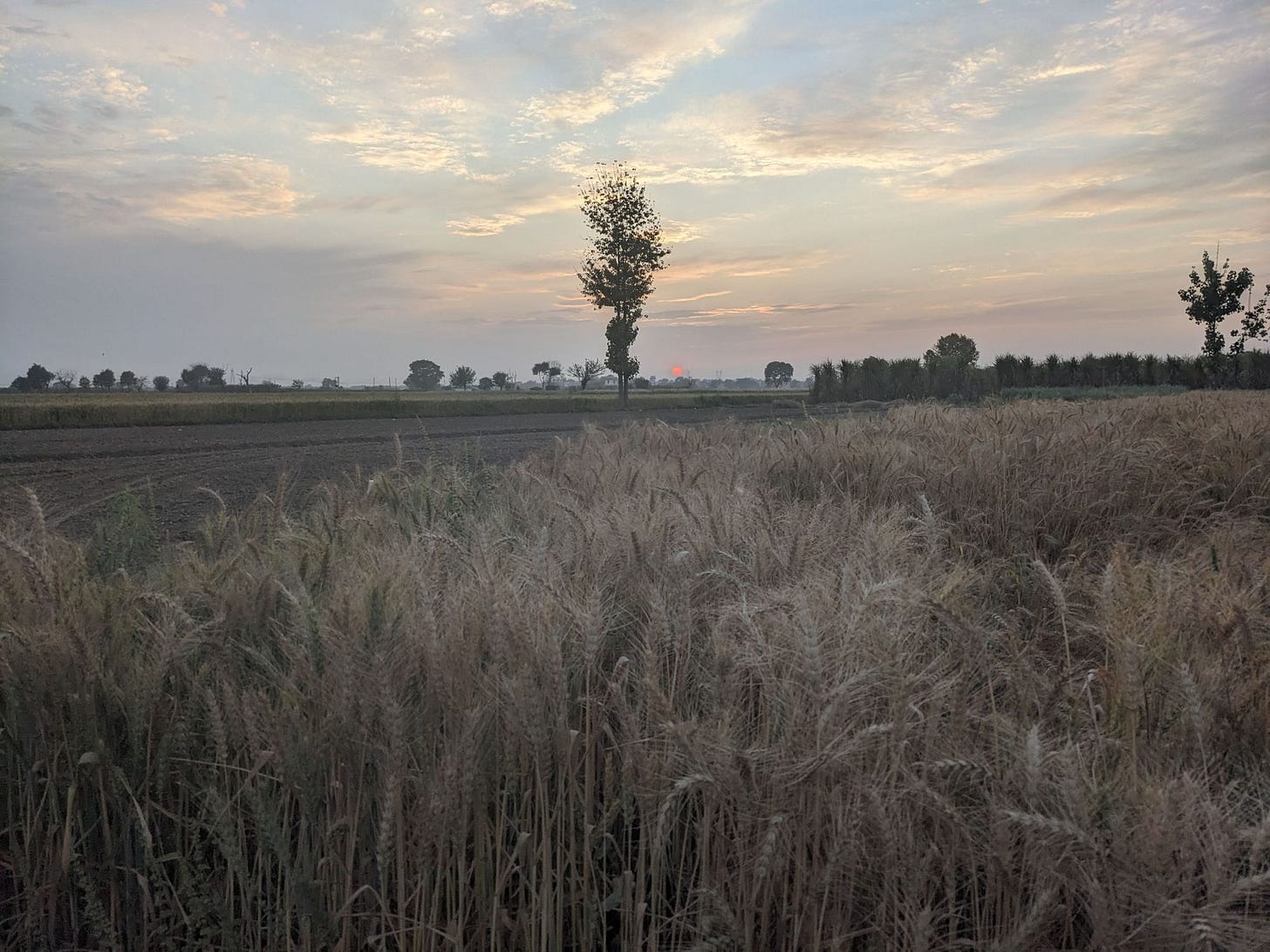resilience
at parent's home, guava tree, changes, a story from Kerala, Paul Theroux, awareness about hill stations, wheat stories, and the pitter-patter of rain
Dear Reader,
Thank you for joining me. I hope your week went well.
In the last newsletter, I shared how my partner and I were traveling in our car from the South of India to the North to my parents house. We arrived a week ago.
We are here now and not really thinking of where we have to go. After these long three and a quarter years of being on the road without a home, my parent’s house is bringing comfort. Now we don’t have to look for a guesthouse, ask the host to fill our water bottles, and try to fit into a yet new chair, hoping to write from it at least for a couple of hours. Even that we don’t have to explore a strange town, or go on a trek or a wildlife safari is soothing for now. Since I arrived I haven’t left home even for five minutes.
I walk in the garden downstairs.
Here is my diary from April 6, after one of the walks in my parent’s garden below. Do excuse me for referring to myself in the third person.
***
I look into the mirror and I see a young Priyanka, a much younger Priyanka. The little (well not so little because she was tall) Priyanka who stood in front of the mirror and combed her hair, right before school. She woke up early, like today. Today, she woke up at 5:22. She was feeling hot. So she increased the fan a bit, hitting her elbow into the almirah on the side of the bed, finding an excuse to tell her mother that the almirah should be removed, which was her original wish. She got up from the bed at 6:40, sleeping in for a little bit longer in the quietness of the early morning, with the fan now cooling the room perfectly.
The young Pri would have woken up at six or a little before six. Her father mostly woke her up. He would call her, telling her about the peacock of gold. She doesn’t remember if in her later high school years, her father continued the same story: the peacock of gold came, you were asleep, wake up early to see it. However, she still woke up before six (for a couple of months even earlier to attend the Mathematics tuition before school). Then she looked around for the peacock, went to the toilet, and prepared her bag—actually no, she always readied her bag the previous night. She took a bucket bath, got dressed, had her mother stick her bow tie together with a pin, wore her shoes, and she was done. While getting dressed, she looked into the long mirror in her room. While brushing her teeth, she stood in front of the mirror in the hall, in which she was looking today too.
The young Priyanka saw herself, her thin narrow face, her short hair falling on both sides of her head, her bright eyes, searching for something, something bigger, she didn’t know what. Simple brown beautiful face full of hope for the future—the old Pri would like to think.
Today her face was very similar to that girl's. After going to the toilet, she went onto the verandah, already lit with morning light. The old guava tree was being brightened up by the yellow sun. Or one can say, it was being yellowed by the bright sun. She put the dirty clothes from the big pile they had been carrying in from their travels in the washing machine and went down into the garden.
The ground is packed solid with many jamun tree leaves. Sparse tufts of grass are witness to a cold winter which didn’t let anything survive. The air is cool. She walks, aware of the dry earth under her feet, to the end of the garden, enchanted from the first moment. The trees aren’t all as she recognised them. The guava is small, with a big branch of it cut but still a big part of it remaining. She walks, crushing the dry jamun leaves under her feet.
Her mother has left the ground free for herself to walk. With her growing age, she wants the earth plain, no obstructions, no hurdles in her step. She is scared that rocks and mounds and plants et cetera will imbalance her step.
Soon, she reaches the end where the trees that her mother cut from under the wall of another house, who occasionally complained about the seepage, are still missing. Only some of the trees Priyanka and her mother had replanted in other spots of the garden, but most they had cut. Her mother wanted to keep the edge like a garden not like a forest, a jungle as it had become and as how Priyanka liked. Now a small hibiscus and some other little plants stands there, and everything else gone.
Now she is under the guava tree. The guava tree that she has seen the same since her childhood. She doesn’t remember the house without that tree. It has always stood in that corner, like the family’s oldest friend.
The gnarly, shiny, silky trunk is the same, old, but it doesn’t show its age. Many tall reaching branches, and the main branch which used to protrude into the balcony of the house has been cut. Maybe it hurt the tree. It never complained. It is full of green leaves, now big since they must have started sprouting as soon as the winter descended. This tree has so much life.
Under the green, yellowing canopy of her old friend, she stands. And looks above. Aah, the tree. And something she didn’t realise before—this tree has always been here. It has suffered and accepted all the changes, we grew up around it, then left, one by one, it lost many of its fellow tree friends, some guavas itself and a neem, lime, and so many more, it lost its branches and the main branch, all of them off shooting into the sky, it has been cut short, limited in space, has lost its parrots and monkeys, still it stands strong and patient. One of its arms is taut and upwards, holding the weight of the whole tree growing further on from there, all muscle, no fat, no shrinkage.
How strong, she grabs the arm and exclaims!
When the tree can see all the changes, accept all the changes, and still stand strong then why can’t I? She thinks. This tree has given me strength today. It is a living symbol of resilience. With this thought, the pain in her heart for the cutting of other trees subsides. Yes, much has changed in the house, much more will change. Her parents—who used to get out of bed at six—and are still in bed beyond seven—will age more.
But like the guava tree, she can accept everything and still be strong.
She hugs the tree, calls it her friend, “Hey friend,” touches the leaves, unwillingly breaks one small one, crushes it with her fingers, and smells it. She touches its gnarly roundness around the trunk, the surface of the cut branch which is browner than the rest of the trunk, wondering if her touch hurts the tree, holds the strong branch again and again, gently runs her hand over the leaves, and looks up at the yellow edges of the new green leaves. She is smiling, the skin of her face is breathing and alive, she knows her face is glowing, and her eyes are brimming with love and hope and light as the leaves.
She climbs up to make tea for herself and sits to write.
Has much changed around you? How are you coping with it?
For this week’s letter,
Some of my writing,
quotes I love,
things to read,
things to watch,
and
travel tips.
Article of the Week,
Finding a Home in a Village in Wayanad (Kerala): Day 1, Episode 1
The story of my partner and me finding a guesthouse with kitchen in a village in Wayanad (Kerala) that strengthened our belief: keep hoping despite all odds.
This is Episode 1 of our first day in the house. Either two or three more episodes for the subsequent days to follow.
Read the narrative now. Or Pocket it for later.
Quotes I Love
“We travel for pleasure, for a door-slamming sense of “I’m outta here,” for a change of air, for edification, for the big vulgar boast of being distant, for the possibility of being transformed, for the voyeuristic romance of gawping at the exotic.”
Paul Theroux
“Nowadays, people seem suddenly mature, in every respect, than those who belonged to those earlier times. Those days, everyone, old or young, was youthful at heart.”
Tagore
“We have to be able to do something slowly before we can have any hope of doing it correctly with speed.”
Josh Waitzkin
“Successful people do what unsuccessful people are not willing to do; they put the slight edge to work for them, rather than against them, every day. They refuse to let themselves be swayed by their feelings, moods, or attitudes; they rule their lives by their philosophies and do what it takes to get the job done, whether they feel like it or not.”
Jeff Olsen
What is discipline but the awareness that nothing gets done without doing.
Yours Truly
What I’ve Been Reading
I’ve been reading short stories, books, articles, and so much more. I can’t possibly list all what I have read in the past week so I’m putting down the things I found most relevant and worthwhile.
Kodaikanal | The hills are (barely) alive—A must read on the vulnerable ecosystem of hills that is easily put in danger by unplanned and reckless tourism, the issues locals face in trying to protect their homeland, and the need for immediate planning needed in India’s tourism destinations, especially in the mountains. The government, local authorities, forest department, citizens, and tourists all have to join hands and come up with solutions for garbage control, water distribution, rain water storage, traffic management, parking, guesthouses availability and numbers, noise pollution control, protecting the local heritage and architecture, forest and wildlife preservation, and so on.
“Kodaikanal is just one of the numerous hill stations in the Western Ghats. Varying in height, accessibility and popularity, they share the same complex problems that are compounded by unregulated tourism: narrow winding roads up steep inclines, poor infrastructure, limited medical care and negligible parking space. Tourism is just one of the many issues that plague the hills.”
“Kodaikanal is a microcosm of a national problem. Our mountains need better scrutiny to ensure their fragile ecosystems do not buckle under rampant development and tourism.”
As I was recently in Kodaikanal for a week, I can tell that the mountain town needs all of these solutions and a lot of care and love from locals as well as tourists, else it won’t be a respite and rescue place for anyone. Same is the situation of Ooty, Coorg, Chikmagalur, and places in Himachal.
How are we all individually going to ameliorate the situation? Perhaps by being aware of the consequences of our actions.
As I am reading a lot of books together, I don’t have one to share here yet. These are the ones I’m reading: The Deep South by Paul Theroux , Virginia Woolf’s: The Diary and a Passionate Apprentice, Everybody Loves a Good Draught by P Sainath, The Argumentative Indian by Amartya Sen, Strange Tales of World Travel, Before the Coffee Gets Cold, and The Art of Memoir by Mary Karr.
What I’ve Been Watching/Listening
that’s worth mentioning
the wonderful story of Henry Sugar—My partner suggested we see the short movie based on Roald Dahl’s iconic, eponymous tale. I wasn’t disappointed. I rarely watch movies—not because I don’t like them but I want to read more than I want to see. This one was worth it. It is a little entertaining depiction of how a man trains to see with his eyes blindfolded and how he uses the technique to win in casinos. I will soon read the story as well (linked above).
And for all adventure lovers!
Sharing pictures from our road journey through the Indian states of Maharashtra, Madhya Pradesh, Haryana, and Uttar Pradesh. Luckily, it was the harvesting season for wheat, and so I have some wheat stories to share.
farmers harvesting wheat, taken from my car window
whole families harvesting wheat. A boy holds the family baby as the women cuts the dry wheat plants
wheat straw laid in bundles
wheat straw being carried. The bright red color of the woman’s dress suggests she might be newly married.
a simple, under-construction village home I found enchanting
a man and little children playing cricket at the end of the day
a child playing with a tree to entertain himself. everyone else was busy harvesting wheat
such are the sunsets on the road
some food from the road
a sunset from a ripe wheat field
Thank you for reading.
I hope rain pitter patters on leaves around you too :)
Let me know what you think about this letter. Press reply.
Yours,
Priyanka
Some housekeeping… This email may end up up in the Promotions tab of your inbox. If you don’t find the newsletter during the week, go to your Promotion tab and move this email to your Primary inbox. Looking Inwards letter will be in your inbox every week from then on.

